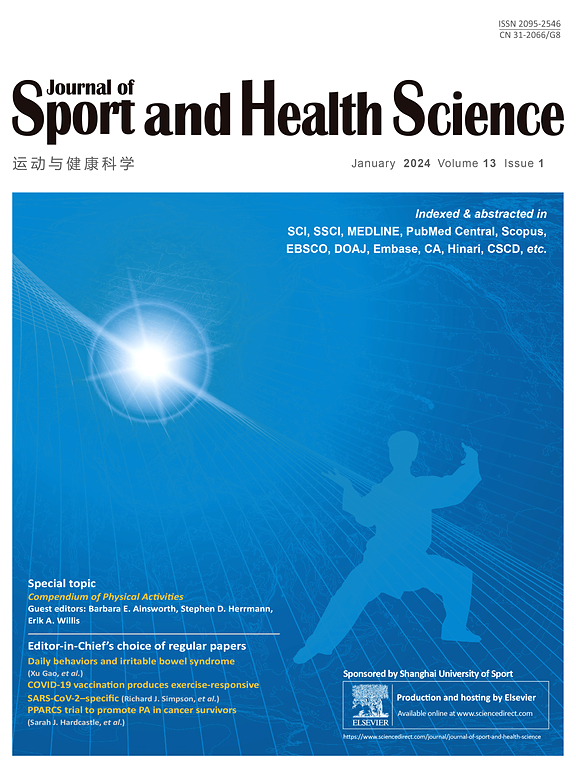Exercised gut microbiota improves vascular and metabolic abnormalities in sedentary diabetic mice through gut‒vascular connection.
IF 10.3
1区 医学
Q1 HOSPITALITY, LEISURE, SPORT & TOURISM
引用次数: 0
Abstract
BACKGROUND Exercise elicits cardiometabolic benefits, reducing the risks of cardiovascular diseases and type 2 diabetes. This study aimed to investigate the vascular and metabolic effects of gut microbiota from exercise-trained donors on sedentary mice with type 2 diabetes and the potential mechanism. METHODS Leptin receptor-deficient diabetic (db/db) and nondiabetic (db/m+) mice underwent running treadmill exercise for 8 weeks, during which fecal microbiota transplantation (FMT) was parallelly performed from exercise-trained to sedentary diabetic (db/db) mice. Endothelial function, glucose homeostasis, physical performance, and vascular signaling of recipient mice were assessed. Vascular and intestinal stresses, including inflammation, oxidative stress, and endoplasmic reticulum (ER) stress, were investigated. RNA sequencing analysis on mouse aortic and intestinal tissues was performed. Gut microbiota profiles of recipient mice were evaluated by metagenomic sequencing. RESULTS Chronic exercise improved vascular and metabolic abnormalities in donor mice. Likewise, FMT from exercised donors retarded body weight gain and slightly improved grip strength and rotarod performance in recipient mice. Exercise-associated FMT enhanced endothelial function in different arteries, suppressed vascular and intestinal stresses, and improved glucose homeostasis in recipient mice, with noted microRNA-181b upregulation in aortas and intestines. Altered gut microbiota profiles and gut-derived factors (e.g., short-chain fatty acids and glucagon-like peptide-1) as well as improved intestinal integrity shall contribute to the cardiometabolic benefits, implying a gut‒vascular connection. CONCLUSION This proof-of-concept study indicates that exercised microbiota confers cardiometabolic benefits on sedentary db/db mice, extending the beneficial mechanism of exercise through gut‒vascular communication. The findings open up new therapeutic opportunities for cardiometabolic diseases and shed light on the development of exercise mimetics by targeting the gut microbiota.锻炼后的肠道微生物群通过肠道-血管连接改善久坐糖尿病小鼠的血管和代谢异常。
运动对心脏代谢有益,降低心血管疾病和2型糖尿病的风险。本研究旨在探讨来自运动训练供体的肠道微生物群对2型糖尿病久坐小鼠血管和代谢的影响及其潜在机制。方法对睡眠素受体缺陷型糖尿病(db/db)和非糖尿病(db/m+)小鼠进行8周的跑步运动,在此期间,从运动训练型糖尿病(db/db)小鼠到久坐型糖尿病(db/db)小鼠并行进行粪便微生物群移植(FMT)。评估受体小鼠的内皮功能、葡萄糖稳态、身体表现和血管信号。研究了血管和肠道应激,包括炎症、氧化应激和内质网应激。对小鼠主动脉和肠组织进行RNA测序分析。通过宏基因组测序评估受体小鼠的肠道微生物群谱。结果慢性运动可改善供体小鼠血管和代谢异常。同样,来自运动供体的FMT延缓了受体小鼠的体重增加,并略微改善了握力和旋转棒的表现。运动相关的FMT增强了受体小鼠不同动脉的内皮功能,抑制了血管和肠道应激,改善了葡萄糖稳态,并在主动脉和肠道中显著上调了microRNA-181b。肠道菌群特征和肠道衍生因子(如短链脂肪酸和胰高血糖素样肽-1)的改变以及肠道完整性的改善有助于心脏代谢益处,这意味着肠道与血管的联系。结论:这项概念验证研究表明,运动后的微生物群对久坐的db/db小鼠具有心脏代谢益处,通过肠道-血管交流扩展了运动的有益机制。这一发现为心脏代谢疾病开辟了新的治疗机会,并通过针对肠道微生物群,揭示了运动模拟物的发展。
本文章由计算机程序翻译,如有差异,请以英文原文为准。
求助全文
约1分钟内获得全文
求助全文
来源期刊

Journal of Sport and Health Science
SPORT SCIENCES-
CiteScore
18.30
自引率
1.70%
发文量
101
审稿时长
22 weeks
期刊介绍:
The Journal of Sport and Health Science (JSHS) is an international, multidisciplinary journal that aims to advance the fields of sport, exercise, physical activity, and health sciences. Published by Elsevier B.V. on behalf of Shanghai University of Sport, JSHS is dedicated to promoting original and impactful research, as well as topical reviews, editorials, opinions, and commentary papers.
With a focus on physical and mental health, injury and disease prevention, traditional Chinese exercise, and human performance, JSHS offers a platform for scholars and researchers to share their findings and contribute to the advancement of these fields. Our journal is peer-reviewed, ensuring that all published works meet the highest academic standards.
Supported by a carefully selected international editorial board, JSHS upholds impeccable integrity and provides an efficient publication platform. We invite submissions from scholars and researchers worldwide, and we are committed to disseminating insightful and influential research in the field of sport and health science.
 求助内容:
求助内容: 应助结果提醒方式:
应助结果提醒方式:


